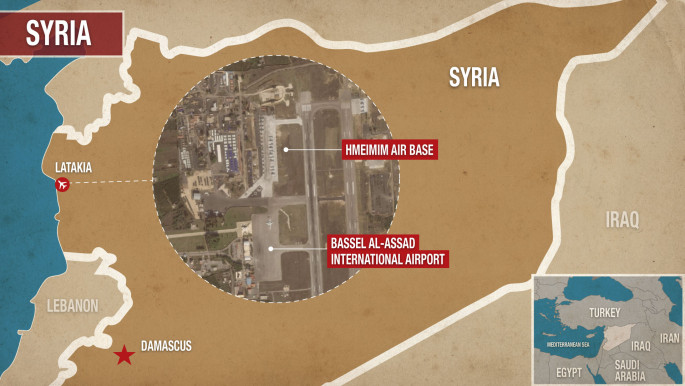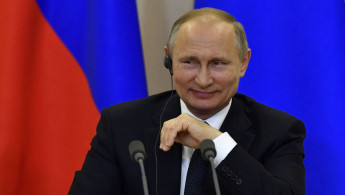Russia's next half-century in Syria
Russian President Vladimir Putin has signed a law ratifying a deal reached with the Syrian regime which permits Russian forces to remain at Hmeimim Airbase in the country's western Latakia province for at least another 49 years.
Damascus agreed in January to lease the Syrian port of Tartus, along with the airbase, meaning that the Russian military can base jet fighters and warships in Syria for decades to come.
This is a clear sign that Russia has gained a valuable strategic gift from Damascus for its decisive intervention in the Syrian conflict, which enabled the Syrian regime to retake the offensive against its ragtag rebel adversaries across the country.
"Moscow didn't want to mention any time terms, while Damascus insisted on putting that 49-year clause in the treaty," Timur Akhmetov, a Middle East analyst at the Russian International Affairs Council, told The New Arab.
"Damascus wanted to have something specific rather than general terms" to demonstrate that, while long-term, the deal is not necessarily permanent, Akhmetov added.
 |
This treaty also gives legal immunity to Russian military personnel in Syria |  |
Nevertheless, even after 49 years elapse, Russia can negotiate additional 25-year leases for the two facilities.
"This treaty also gives legal immunity to Russian military personnel in Syria," Akhmetov explained. In practice this means if Syrian civilians are killed by the Russian military during operations in Syria, Moscow will not be held accountable by Damascus.
"So Russia has less of a headache about its presence in Syria," he added. "In general, that treaty must be viewed as a normal thing, normal for relations between states that plan to develop strategic cooperation."
 |
|
Unhindered access to these facilities will give the Russians a foothold in the Mediterranean Sea and a warm-water port of the kind their Soviet forefathers could only have dreamed.
"If our new combat surface ships and submarines outfitted with Kalibr cruise missiles are based in Tartus, this will allow Moscow to keep the situation in the Middle East and Mediterranean under control," a military analyst named Igor Korotchenko told Russia's Sputnik News back in October.
Moscow's latest five-year plan will transform the Tartus port from a basic naval depot into a base where larger Russian ships can dock.
 |
Moscow hopes to be there for a long period of time |  |
"Russia is now investing into Tartus," Akhmetov said. The expansion will see Tartus port dredged so, according to an anonymous source cited by Sputnik, "cruisers and even possibly aircraft carriers" can use the facility. Furthermore, Russian military activities at Tartus "will also be beyond Damascus' jurisdiction".
"Moscow hopes to be there for a long period of time," Akhmetov said. "So it might have got guarantees from the current regime, or at least is sure that any future government will not change terms in this regard."
Nevertheless, expanding and modernising Tartus will be an expensive endeavour for Moscow.
"Russia is trying to get options for expanding its presence, still to implement any expansion of presence it needs financial resources, and this is a problem," Akhmetov concluded.
Russia has closely backed Syrian President Bashar al-Assad since intervening in Syria: its primary aim in the war-torn country appears to be to keep it from fragmenting while preserving a friendly client regime in Damascus - which doesn't necessarily have to be headed by Assad.
Rather than seeking to dominate Syria through force of arms in order to retain bases there, as its Soviet predecessor attempted to do in Afghanistan, Russia is fighting to maintain a status quo whereby they have bases in Syria rather than fighting to keep Syria itself as a base.
 |
Moscow's agreement with the current regime rewards them with a sizable strategic foothold |  |
This is similar to how Britain came to have permanent military bases on the nearby island nation of Cyprus. Before Cyprus got its independence from Britain in 1960, Welsh Labour Party politician Aneurin Bevan criticised the British government's policy there, arguing that they didn't know whether they wanted "Cyprus as a base or a base in Cyprus... They could have had the second if they had not insisted on the first".
In the end that's exactly what happened. Britain has maintained two large territories which host military bases in Cyprus - Akrotiri and Dhekelia, also referred to as British Sovereign Base Areas (SBAs) - for almost sixty years in a strategically important part of the Mediterranean. There they have soldiers, a listening station and a Royal Air Force base. This enables Britain to gather intelligence as well as attack potential adversaries in that key region without having to control the entire country, as they did with protectorates during the days of the British Empire.
Russia welcomes a settlement to the Syrian conflict, now that Damascus has an advantageous position over the remnants of the opposition. Its agreement with the current regime rewards them with a sizable strategic foothold, situated a stone's throw from NATO member Turkey - itself home to the major Incirlik Airbase - Cyprus, Israel, Jordan, Lebanon and Iraq for decades to come.
While Putin did stress the limited ad-hoc nature of Russia's intervention in Syria, which former US President Barack Obama initially predicted would lead to a quagmire, a long-term Russian military presence in this important region enhances national prestige in the eyes of Putin's domestic audience and their image of Russia as a re-emerging world power.
Paul Iddon is a freelance journalist based in Erbil, Iraqi Kurdistan, who writes about Middle East affairs.
Follow him on Twitter: @pauliddon



